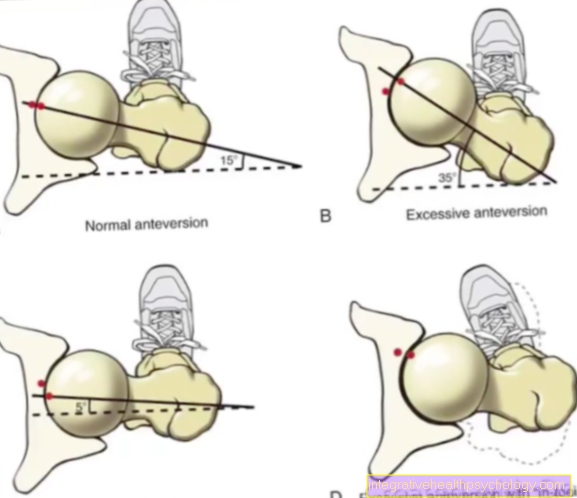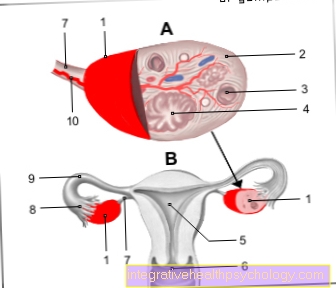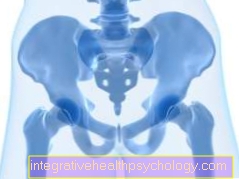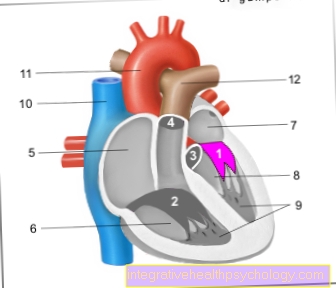These symptoms will tell you that you have gastrointestinal flu
introduction
Typically, the symptoms of gastrointestinal flu appear very suddenly, with the incubation period (i.e. the time between infection and the onset of the first symptoms) depending on the pathogen. The incubation time is usually a few hours and three days. In rare cases gastrointestinal flu can be completely symptom-free, but those affected carry the pathogen within themselves and are contagious during this period.
Here you come to the main topic: Abdominal influenza

Common symptoms
The following symptoms are typical of gastrointestinal flu:
- nausea
- Vomit
- cramping abdominal pain
- diarrhea
- general feeling of sickness and fatigue
- Drowsiness and tiredness
- Loss of appetite
- fever
- Headache and body aches
- Loss of fluids and electrolytes
- Circulatory problems due to fluid loss
- Weight loss, increased heart rate and irregular heartbeat
The most important symptoms are explained in more detail in the following sections of the text.
Vomit
Splashing and violent vomiting are among the main symptoms of gastrointestinal flu. Vomiting is the body's protective mechanism to protect itself against poisoning. When the gastrointestinal tract is infected with bacteria or viruses, the mucous membranes of the stomach and small intestine become inflamed, causing the stomach and intestinal contents to empty in reverse. The very contagious noro- or rotaviruses in particular lead to severe attacks of vomiting. Frequent and severe vomiting can lead to complications. Frequent vomiting leads to significant loss of fluids and electrolytes (salts). This can lead to metabolic imbalances and even cardiac arrhythmias. Repeated vomiting of stomach acid can damage the lining of the esophagus. Another problem is that ingested medication is not kept in the stomach, but is immediately vomited up again before it can take effect.
With conventional gastrointestinal flu, vomiting itself usually does not need to be treated, unless there is a risk of dehydration (desiccosis). The doctor may then prescribe medication (antiemetics) that are given as suppositories or in syringes. It is important that the loss of fluids and electrolytes is compensated by drinking a lot (e.g. tea with sugar and a little salt or cola with pretzel sticks). This should best be done in sips so as not to burden the irritated stomach even more.
Find out more about this topic: Vomiting such as Home remedies for vomiting
nausea
Gastrointestinal flu is often associated with severe nausea and subsequent vomiting. Like vomiting, nausea is a protective mechanism of the body and is a reaction to the pathogens in the gastrointestinal tract. Nausea is controlled by the central and autonomic nervous systems, with the vomiting center located in the brain. Nausea is noticeable as a queasy feeling in the stomach area and nausea. But you don't always have to break when you feel sick. Sometimes vomiting leads to a temporary improvement in nausea.
With severe nausea, those affected lose their appetite and can no longer eat any food. Warm peppermint or chamomile tea and vegetable broth can be drunk so that the patient is still adequately supplied with fluids and nutrients. Fresh air and lying quietly can relieve nausea. In most cases, special therapy for nausea is not necessary. If the nausea is very severe, the doctor can administer an anti-emetic drug.
You might also be interested in this topic: Medicines for nausea
stomach pain
Severe abdominal cramps and abdominal pain are typical symptoms of gastrointestinal flu. The abdominal pain occurs at intervals and is usually accompanied by diarrhea. After going to the toilet, the symptoms can temporarily improve. Warmth helps with severe cramps. Patients are best to go to bed with a hot water bottle and a cup of hot tea and allow their body to relax. Special treatment for abdominal pain is not necessary in the case of gastrointestinal flu and it is sufficient to compensate for the loss of fluid caused by the diarrhea.
Flatulence
The diarrhea associated with gastrointestinal flu can be accompanied by rumbling in the intestines and severe wind (flatulence). Due to the infection of the intestinal mucosa with pathogenic bacteria, the intestine can no longer work properly and cannot digest the intestinal contents completely. Bacterial processes produce more and more gases that make themselves felt as flatulence and are very uncomfortable for the person concerned.
More articles on this topic: Home remedies for flatulence and Anti-flatulence drugs
fever
If you have gastrointestinal flu, a fever can occur, but this is not absolutely necessary. Fever manifests itself as an increased body temperature and alternating phases of intense heat and chills. The body's immune system reacts to the pathogens in the gastrointestinal tract by releasing certain substances (pyrogens). Pyrogens increase the temperature in the body, which means that the germs cannot spread any further and are killed. Fever can be accompanied by hot skin, profuse sweating, and confusion.
also read: How can you lower a fever?
Body aches
Body aches are a typical side effect of infectious diseases and can therefore also occur with gastrointestinal flu. The pain in the limbs manifests itself as sore muscles in the arms and legs. Pain in the limbs is harmless and disappears by itself after a few days. No special treatment is necessary.
More information on this topic: body aches
Bloody diarrhea
Certain pathogens that cause gastrointestinal flu are particularly aggressive and can severely damage the lining of the intestines. The diarrhea that occurs then sets in very suddenly and can be very watery. Sometimes the stool contains blood from the damaged intestinal wall.
A number of bacteria in particular, such as EHEC cause bloody diarrhea, whereas in viral infections blood is rarely found in the stool.
You might also be interested in this topic: Drugs for diarrhea
Back pain
Depending on the pathogen, back pain can also occur as part of gastrointestinal flu. Bowel disease sometimes causes pain in the lower back. The diarrhea that occurs irritates the nerves that supply the intestines. These nerves have their origin in the lumbar spine and also supply the muscles in this area, which can lead to muscle tension and pain in the back in the case of gastrointestinal flu.
dizziness
The frequent vomiting and diarrhea associated with gastrointestinal flu lead to a large loss of fluids. If the patient does not take care to drink enough fluids to make up for the loss, this can lead to a decrease in body water and symptoms of dehydration (desiccosis). As a result, patients have circulatory problems and feel dizzy when they stand up. There is an increased risk of falling, which is why older patients in particular must be particularly careful.
a headache
In addition to the typical symptoms such as vomiting and diarrhea, gastrointestinal flu can also be accompanied by headaches. Headache and tiredness are signs that the body has lost too much fluid and is dehydrated. The reduced amount of fluid in the body makes the blood thicker and harder to flow through small vessels. As a result, the brain with its fine vessels is not supplied with enough oxygen and nutrients, which leads to headaches.
High pulse
If you have gastrointestinal flu, the patient's pulse may rise. The frequent vomiting and diarrhea lead to a large loss of water in the body, which can lead to circulatory disorders and an accelerated heartbeat (tachycardia) and decreased blood pressure. Those affected perceive the increased pulse as a "racing heart". A sufficient supply of fluids increases the amount of water in the body and thus the blood volume, whereby the heartbeat and pulse normalize again.
Can gastrointestinal flu occur without diarrhea?
Gastrointestinal flu does not necessarily have to result in all of its symptoms. Sometimes only vomiting or just diarrhea occurs. So you can have gastrointestinal flu without suffering from diarrhea. The disease is usually caused by viruses in these cases, as a bacterial infection of the gastrointestinal tract is usually more aggressive and is characterized by bloody diarrhea.
What symptoms does a baby have when they contract gastrointestinal flu?
Babies do not yet have a fully developed immune system and are therefore very sensitive to infections. The main cause of gastrointestinal flu in babies is rotavirus, which causes severe diarrhea and vomiting. Sometimes a fever can also occur.
The greatest danger of developing gastrointestinal flu in babies is dehydration. Vomiting and diarrhea lead to severe fluid loss, which is why it is very important to ensure that the sick child is drinking enough fluids. This is achieved by breastfeeding the children more often and giving them additional fluids in the form of chamomile tea or still water. Infants who are suspected of having gastrointestinal flu must be examined and treated by a doctor. If the baby is very dehydrated, gastrointestinal infections can be fatal and should therefore not be underestimated.
Further information: What to do if my baby has a fever?
What symptoms do toddlers have with gastrointestinal flu?
Especially in the first few years of life, children are more likely to develop gastrointestinal infections, which are usually caused by rota or noroviruses. The symptoms in toddlers and children are similar to those in adults: sudden, gushing vomiting and severe diarrhea occur, which can be accompanied by flatulence. In some cases a high temperature or fever occurs.
In children it is particularly important to protect them from dehydration and to make sure that they drink enough. The disease usually goes away on its own after two to three days. In the case of small children or very severe disease, a pediatrician should be consulted to ensure that the child has not lost too much fluid. For dehydrated children, the doctor may give an electrolyte solution.
You may also be interested in this topic: Vomiting in the toddler
Duration of symptoms
The duration of the symptoms of gastrointestinal flu depends on the pathogen behind the disease. A viral infection with noroviruses or rotaviruses is relatively severe, but the symptoms usually completely disappear after a few days.
Salmonella are bacteria that are mostly ingested through food. After a short incubation period of a few hours, a salmonella infection causes very severe symptoms that last for several days. However, bacteria that are potentially infectious are still excreted in the stool weeks after infection. An infection of the gastrointestinal area with Escherichia coli (E. coli) usually lasts two to eight days, after which the symptoms should have subsided.
Nausea and vomiting are usually the first symptoms to appear and are the first to go away. As a rule, vomiting does not last longer than one to a maximum of three days. The diarrhea is more persistent and persists for a long time, but should be completely gone after two weeks at the latest.





.jpg)























